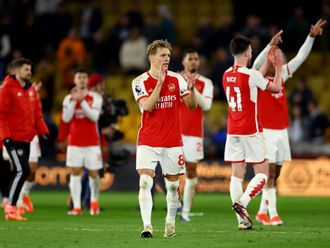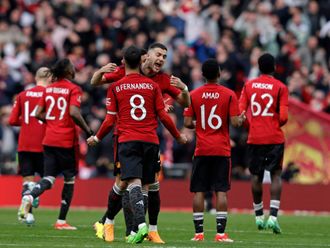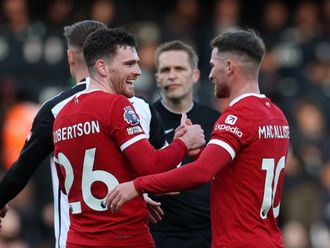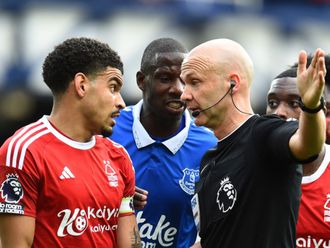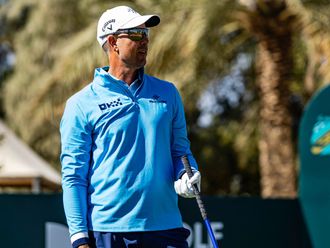Manchester, United Kingdom: For disaffected Manchester United fans there has been a touch of Bullseye about this season. “Look what you could have won,” they have muttered — invoking the Jim Bowen game show — while asking why Jose Mourinho, Carlo Ancelotti or Pep Guardiola were not given Sir Alex Ferguson’s job.
David Moyes, “the chosen one”, was the continuity candidate, selected partly for his empire building potential and in no small part because Mourinho was already on his way back to Chelsea by the time Ferguson began planning his retirement while Guardiola had already accepted the post at Bayern Munich.
For Moyes, then, the sight of a managerial heavyweight in the opposition dugout brings an extra surge of tension. For him, comparisons can be odious. Mismatches were numerous on this Old Trafford pitch.
The fullbacks Phil Jones and Alex Buttner versus the Bayern wide-men, Franck Ribery and Arjen Robben; the central midfield groupings of the 40-year-old Ryan Giggs, Michael Carrick and Marouane Fellaini versus the Bayern trio of Philipp Lahm, Toni Kroos and Bastian Schweinsteiger.
Nor could the vast differential in managerial CVs be ignored. Moyes began at Preston North End in 1998 and spent 11 years at Everton. He has yet to raise a trophy. As a player, Guardiola won six La Liga titles and a European cup. As a manager he steered Barcelona to two Champions League final victories over United in 2009 and 2011 in a four-year spell which yielded 14 trophies.
As Bayern manager he has already won the Fifa Club World Cup and the Bundesliga with a record seven games to spare. Approaching this tie Guardiola’s men were unbeaten in 53 league outings and had set a club record of 19 successive Bundesliga wins.
This was the monumental personal challenge faced by Moyes as Old Trafford greeted the world, European and German champions. He matched Guardiola in the wardrobe department, sporting a smart dark suit, and was determined to compete with his rival in the coaching zone. But nothing could disguise the gulf in quality between the sides as a boisterous start by United gave way after 15 minutes to a pattern of red shirts retreating and blue ones pouring forward.
It took Moyes until March to see that mechanical answers in press conferences and a faintly pained demeanour were not appropriate to a Manchester United manager. Despite heavy home defeats by Liverpool and Manchester City he finally switched tactics in favour of greater positivity.
His programme notes here were optimistic, assertive. But the real challenge was to pick and inspire a side who could avoid being used like training ground cones by Bayern, with their strong, fluent, heavily staffed midfield.
The early signs were good, with Danny Welbeck’s contentiously disallowed offering hope that United could thrive on the counter-attack. Welbeck’s zest unsettled Guardiola, who jabbed his finger at the England striker and told his players to pay more attention to the threat he posed. Soon, though, United found themselves packed into a red defensive block as Ribery and Robben roamed across the line and Bayern kept the ball almost without interruption.
Six minutes before half-time Welbeck blew a gilded chance to send United into the dressing room in front by committing the un-English crime of over-elaboration. Released by Wayne Rooney with a sweeping pass, Welbeck inexplicably tried to dink the ball over the giant Manuel Neuer, and paid for his folly with a fearsome earful from Rooney.
The break came with the crowd reflecting that United might have been 2-0 up at the end of a half in which the ball had been a largely alien object. With Shinji Kagawa replacing Giggs, and Fellaini still clinging on, the Old Trafford career of Moyes took a stunning upward turn when Rooney chipped in a corner and Nemanja Vidic twisted his neck to head it into Neuer’s lower left-hand corner. The siege was broken, but not for long. Eight minutes later, Mario Mandzukic headed back a Rafinha cross for Schweinsteiger to lift into the roof of David de Gea’s net.
Point one is that Moyes at least stirred the spirits of the 11 players he sent into the fray, even if it hurt the eyes to see a United team cede so much possession on their own turf.
Sure, Bayern are the most formidable team in club football. But it is not the United way to display such desperation for long periods in a home game. Moyes could say in mitigation that United threatened the Bayern goal sporadically throughout the game and never allowed Guardiola’s trophy-farmers to relax.
United’s direct, defiant style will not carry them through the next decade. But all they could focus on was finding something to carry them through this night.
In that narrow sense Moyes was able to draw on his Everton years for the biggest night of his professional life. No one expected United to out-pass Bayern, so maybe they could blast them aside instead.
The orchestral heights of the Ferguson years are a memory now. Only a mass influx of quality can revive them. Moyes learnt his trade the hard way, in the Premier League. Yet Europe has been a better hunting ground for him in his turbulent first year at Old Trafford. This performance was more effective than the team sheets said it possibly could be. For that he deserves a few paragraphs of praise.


